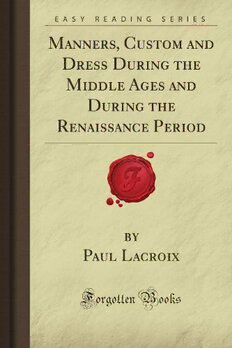
Manners, Custom and Dress During the Middle Ages and During the Renaissance Period (Forgotten Books) PDF
576 Pages·2008·51.928 MB·English
Most books are stored in the elastic cloud where traffic is expensive. For this reason, we have a limit on daily download.
Preview Manners, Custom and Dress During the Middle Ages and During the Renaissance Period (Forgotten Books)
Description:
In sociology, manners are the unenforced standards of conduct which show the actor to be cultured, polite, and refined. They are like laws in that they codify or set a standard for human behavior, but they are unlike laws in that there is no formal system for punishing transgressions, other than social disapproval. They are a kind of norm. What is considered "mannerly" is highly susceptible to change with time, geographical location, social stratum, occasion, and other factors. That manners matter is evidenced by the fact that large books have been written on the subject, advice columns frequently deal with questions of mannerly behavior, and that schools have existed for the sole purpose of teaching manners. A lady is a term frequently used for a woman who follows proper manners; the term gentleman is used as a male counterpart; though these terms are also often used for members of a particular social class. (Quote from wikipedia.org)About the AuthorPaul Lacroix (1806 - 1884)Paul Lacroix (April 27, 1806 - October 16, 1884), French author and journalist, was born in Paris, the son of a novelist.He is best known under his pseudonym of P.L. Jacob, bibliophile, or Bibliophile Jacob, suggested by the constant interest he took in public libraries and books generally. Lacroix was an extremely prolific and varied writer. Over twenty historical romances alone came from his pen, and he also wrote a variety of serious historical works, including a history of Napoleon III, and the life and times of the Tsar Nicholas I of Russia.He was the joint author with Ferdinand Sere of a five-volume work, Le moyen age et la renaissance (1847), a standard work on the manners, customs and dress of those times, the chief merit of which lies in the great number of illu
See more
The list of books you might like
Most books are stored in the elastic cloud where traffic is expensive. For this reason, we have a limit on daily download.
